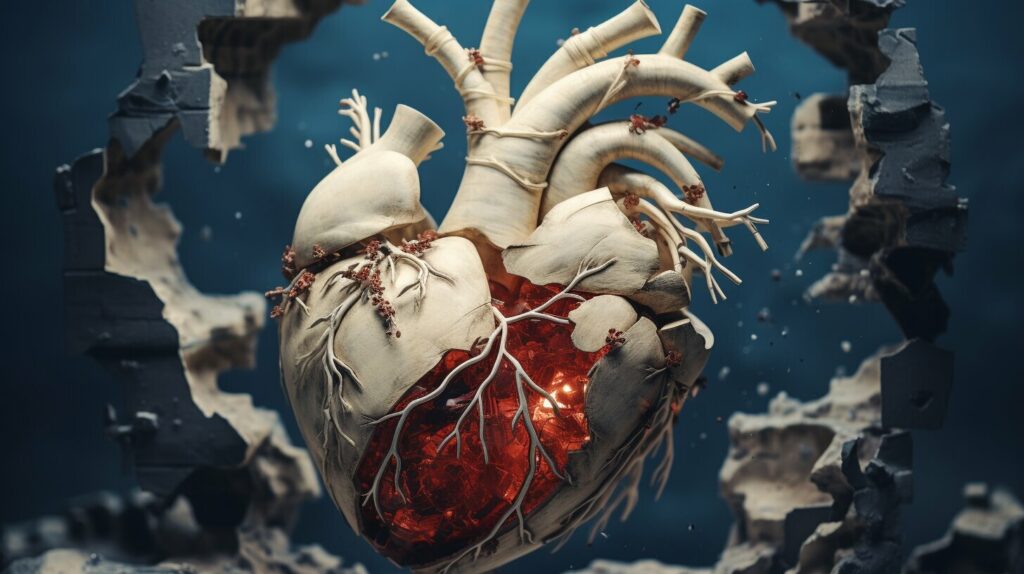How Divorce Impacts Mental Health is profound, as this major life transition introduces numerous emotional and psychological challenges. Regardless of whether you’re in the midst of it or have concluded the process, recognizing its influence on your well-being is vital.
Divorce can be a stressful and isolating experience, and it’s not uncommon to experience a range of emotions, including sadness, anger, and anxiety. It’s essential to acknowledge these feelings and take steps to prioritize your mental health during this challenging time.
In this article, we will explore the mental health effects of divorce and the impact it can have on individuals, particularly in terms of their emotional well-being, sense of self, and physical health. We will also discuss strategies for coping with divorce and rebuilding your life post-divorce.

- Understanding How Divorce Impacts Mental Health
- Increased Risk of Depression and Anxiety
- Impact on Self-Esteem and Identity
- Effects on Children’s Mental Health
- Financial Stress and Mental Health
- Social Support and Coping Mechanisms
- Seeking Professional Help
- Taking Care of Your Physical Health
- Building a New Future and Moving Forward
- Conclusion


Key Takeaways:
- Divorce can have a significant impact on your mental health, causing feelings of sadness, anger, and anxiety.
- It’s crucial to prioritize your mental health during and after divorce, seeking support from friends, family, and professionals if needed.
- Divorce can also have a significant impact on children’s mental health, leading to behavior problems and increased risk of anxiety and depression.
- Financial stress is a common consequence of divorce that can also impact mental health.
- Taking care of your physical health, including exercise and self-care practices, can also promote overall well-being during and after divorce.
Understanding How Divorce Impacts Mental Health
Divorce can have a significant emotional impact on individuals, leading to feelings of sadness, anger, and grief. The emotional toll of divorce can also manifest in physical symptoms, such as fatigue and changes in appetite or sleep patterns.
It is essential to acknowledge and process these emotions to avoid negative long-term effects on mental health. One way to do this is by seeking support from friends, family, or a therapist.
Dealing with Grief and Loss
Grief and loss are common emotions experienced during and after a divorce. It is essential to recognize the stages of grief and give oneself time to process each stage. Allow yourself to feel the emotions and express them in healthy ways.
It is also helpful to accept the reality of the situation and let go of any resentment or anger towards the other person. Holding onto negative emotions can prolong the healing process and hinder personal growth.
Managing Stress and Anxiety
The stress and anxiety of divorce can be overwhelming. It is important to find healthy ways to manage these emotions, such as practicing relaxation techniques like meditation or yoga, engaging in regular physical activity, or talking to a therapist.
Another way to manage stress is by organizing one’s thoughts and responsibilities. Creating a to-do list or a schedule can help reduce anxiety and provide a sense of control during a chaotic time.
Embracing Change
Divorce often involves significant life changes, such as adjusting to a new living situation or co-parenting with an ex-spouse. Embracing change can be challenging, but it is important to focus on the positive aspects of the new situation.
Try to find new hobbies or activities that bring joy and fulfillment. Surround oneself with supportive friends and family who can provide encouragement during this transitional period.
Remember that healing and moving forward takes time, but with the right support and coping mechanisms, it is possible to thrive after a divorce.


Increased Risk of Depression and Anxiety
Divorce is a significant life stressor that can have a profound impact on an individual’s mental health. Studies have shown that divorce is associated with an increased risk of depression and anxiety. In fact, individuals who have gone through a divorce are two to three times more likely to experience depression and anxiety than those who have not.
There are several factors that contribute to this increased risk. Divorce often brings a sense of loss and grief, which can lead to feelings of sadness, hopelessness, and despair. The disruption of daily routines and social supports can also contribute to feelings of loneliness and isolation, which can exacerbate symptoms of depression and anxiety.
Additionally, the financial stress that often accompanies divorce can be a significant source of anxiety. The uncertainty of the future, coupled with the financial strain of dividing assets and potentially paying alimony or child support, can create a sense of instability and insecurity.
It is important to acknowledge and address the mental health effects of divorce. Seeking support from friends, family, or a mental health professional can help individuals cope with the emotional toll of divorce and reduce the risk of developing depression or anxiety disorders. Therapy or counseling can also provide individuals with tools to manage symptoms and improve overall well-being.


“Divorce is a significant life stressor that can have a profound impact on an individual’s mental health.”
Impact on Self-Esteem and Identity
Divorce can have a profound impact on an individual’s self-esteem and sense of identity. The dissolution of a marriage often leaves individuals feeling lost, confused, and unsure of their place in the world. The emotional upheaval of divorce can be overwhelming, and it can take time to rebuild one’s self-worth.
Many individuals who go through a divorce experience feelings of failure and inadequacy. They may blame themselves for the end of the marriage, even if the reasons for the divorce were beyond their control. Additionally, the process of divorce often involves personal attacks and criticisms that can further damage one’s self-esteem.
It’s important for individuals going through a divorce to recognize that their self-worth is not defined by their relationship status. Divorce does not diminish their value as a person, and it’s essential to separate their identity from the marriage and its outcome.
Rebuilding self-esteem after a divorce takes time and effort. It’s crucial to practice self-care and engage in activities that bring joy and fulfillment. Surrounding oneself with supportive friends and family can also help boost self-esteem and provide a sense of belonging.
Impact on Identity
Divorce can also impact an individual’s sense of identity. Marriage often becomes a significant part of one’s identity, and the end of a marriage can leave individuals feeling as though they’ve lost a part of themselves.
It’s essential to grieve the loss of the marriage and the identity that was tied to it. However, it’s also an opportunity to rediscover oneself and create a new identity. This can involve exploring new hobbies and interests, setting new goals, and pursuing new career opportunities.
It’s important to remember that divorce is a significant life transition, and it’s normal to feel a variety of emotions during this time. Seeking support from a therapist or counselor can help individuals process their emotions and navigate the challenges of rebuilding their self-esteem and identity.


“Divorce does not diminish their value as a person, and it’s essential to separate their identity from the marriage and its outcome.”
Effects on Children’s Mental Health
Divorce can have a significant impact on children’s mental health, with many children experiencing feelings of sadness, anger, and confusion. Research has shown that children of divorced parents are at an increased risk of developing behavioral problems, anxiety, and depression.
It is important for parents to be aware of these risks and take steps to support their children during this difficult time. This may include seeking professional help, talking openly with children about their feelings, and creating a safe and supportive home environment.


One way to support children through a divorce is to encourage open and honest communication. Children may have many questions and concerns about the divorce, and it is important for parents to provide accurate and age-appropriate information. Parents should also listen actively to their children’s concerns and validate their feelings.
Creating a stable and consistent home environment can also help to support children’s mental health during and after a divorce. This may involve maintaining consistent routines and schedules, providing a safe and loving environment, and avoiding conflict and negativity in front of children.
For children who may be struggling with their emotions, seeking professional help can also be beneficial. Therapy can provide children with a safe and supportive environment to express their feelings and develop coping skills. Parents may also benefit from therapy or counseling to help them navigate the challenges of co-parenting and supporting their children’s mental health.
Financial Stress and Mental Health
Divorce can bring significant financial stress, which in turn affects mental health. The financial impact of divorce can be wide-ranging, from dividing assets and property to paying legal fees and alimony. The resulting financial strain can lead to anxiety, depression, and a sense of overwhelming stress.
According to a study by the Institute for Divorce Financial Analysis, 60% of divorcing couples do not have a financial plan in place, leading to costly mistakes and long-term financial instability. It is crucial to seek professional financial advice and establish a solid financial plan to alleviate some of the stress and uncertainty that comes with the divorce process.
A study published in the Journal of Family and Economic Issues found that women are particularly vulnerable to financial stress after a divorce, with a significant drop in income and a higher likelihood of poverty. This financial strain can take a toll on mental health, leading to feelings of anxiety, hopelessness, and even suicide.
It is important to acknowledge the financial impact of divorce and take steps to mitigate its effects. This may include seeking financial counseling, establishing a budget, and developing a plan to manage debt. By taking control of their finances, individuals can reduce the burden of financial stress and improve their overall mental well-being.


“The connection between financial stress and mental health cannot be ignored. It is crucial to acknowledge the financial impact of divorce and take steps to mitigate its effects.”
Social Support and Coping Mechanisms
Divorce can be an incredibly isolating experience, which is why having a support system in place is so crucial. Whether it’s friends, family, or a support group, having people who understand what you’re going through can make a huge difference in your mental health.
If you’re struggling to find people you can lean on during this difficult time, consider seeking out a divorce support group. These groups offer a safe and non-judgmental space to share your experiences and connect with others who are going through similar challenges.
Additionally, it’s important to develop healthy coping mechanisms to manage the stress and emotions that come with divorce. This could include practicing mindfulness or meditation, taking up a new hobby, or simply making time for self-care activities that make you feel good.
Examples of Coping Mechanisms:
- Deep breathing exercises
- Journaling
- Exercising regularly
- Spending time in nature
- Engaging in creative activities, such as painting or playing music
Remember, everyone copes with divorce differently, and it’s okay if your coping mechanisms don’t look the same as someone else’s. The most important thing is finding what works for you and prioritizing your mental wellbeing.


“Having people who understand what you’re going through can make a huge difference in your mental health.”
Seeking Professional Help
Divorce can be an emotional rollercoaster, and it’s essential to prioritize mental health during and after the process. Seeking professional help, such as therapy or counseling, is one way to promote mental well-being and create a safe space to process your emotions.
Therapy after divorce can help individuals work through feelings of sadness, anger, and grief, as well as manage anxiety and depression symptoms that may arise. A therapist can provide support and guidance on coping strategies and help you build resilience throughout the process.
Counseling for divorce can also be beneficial for couples who are going through a divorce. A counselor can help facilitate communication and provide a neutral space to work through issues, making the process less stressful and contentious.
Types of Therapy
There are different types of therapy available that can be effective during and after divorce:
| Therapy Type | Description |
|---|---|
| Individual Therapy | A one-on-one session with a therapist to work through personal emotions and challenges. |
| Group Therapy | A session with a group of individuals who are experiencing similar challenges and provide support to each other. |
| Cognitive Behavioral Therapy (CBT) | A type of therapy that helps individuals identify negative thought patterns and behaviors and replace them with positive ones. |
| Family Therapy | A session that involves family members and addresses issues and challenges affecting the family unit. |
No matter what type of therapy you choose, it’s important to find a therapist you feel comfortable with and trust. Take your time when selecting a therapist and ask questions to ensure that you find the right fit.


When you prioritize your mental health and seek support during and after divorce, you’re taking a crucial step towards healing and moving forward. Don’t hesitate to reach out for help if you need it.
Taking Care of Your Physical Health
Divorce can take a toll on an individual’s physical health, as well as their mental health. It is important to prioritize self-care during this challenging time to promote overall well-being.
Regular exercise is a vital aspect of physical self-care. Physical activity can reduce stress, improve mood, and boost self-esteem. Consider joining a gym or taking up a new physical activity such as yoga, hiking, or dance.
Proper nutrition is also crucial for physical health. A balanced diet can help manage stress and provide the energy needed to navigate the divorce process. Consider consulting a nutritionist for guidance on a healthy eating plan.
Self-care practices such as getting enough sleep, practicing relaxation techniques, and taking breaks when needed can also benefit physical health. It is important to listen to your body and give yourself the care you need during this time of transition.


In addition to these practices, seek professional medical help if necessary. Consult with your doctor if you are experiencing physical symptoms such as headaches, fatigue, or digestive issues. They can help identify any underlying health issues and provide appropriate treatment.
Taking care of your physical health during and after divorce is essential for promoting overall well-being. Prioritizing self-care practices such as exercise, nutrition, and rest, can help manage stress and increase resilience during this challenging time.
Building a New Future and Moving Forward
Divorce can be a challenging time, but it can also be an opportunity for growth and self-discovery. Moving forward after divorce requires effort and determination, but it’s worth it to create a life you love.
Setting New Goals
One way to start building a new future is by setting new goals. Perhaps you’ve always wanted to travel, start a new career, or learn a new skill. Now is the time to make those aspirations a reality. Writing down your goals and creating a plan to achieve them can help you stay motivated and focused.
Creating a Support System
Having a strong support system can make all the difference in rebuilding after divorce. Consider joining a support group, connecting with old friends, or making new ones. It’s important to have people in your life who can offer emotional support and encouragement.


Embracing New Opportunities for Personal Growth
Going through a divorce can be a transformative experience. Don’t be afraid to embrace new opportunities for personal growth. Maybe you want to start a new hobby, take a class, or volunteer in your community. Doing things that bring you joy and fulfillment can help you move forward and create a life you love.
Remember to Take Care of Yourself
During and after divorce, it’s important to prioritize your physical and emotional well-being. Make sure you’re getting enough sleep, eating nutritious foods, and exercising regularly. Additionally, practicing self-care activities like meditation, yoga, or taking a relaxing bath can help you feel more centered and calm.
Remember, moving forward after divorce is a process, and it may not happen overnight. However, with patience, determination, and a positive attitude, you can build a new future filled with happiness and purpose.
Conclusion
Divorce is a challenging life transition that can have a significant impact on an individual’s mental health. As we have explored in this article, divorce can affect emotional well-being, increase the risk of depression and anxiety, impact self-esteem and identity, and cause financial stress. Children can also be greatly affected by divorce, experiencing increased behavior problems, anxiety, and depression.
It is important to acknowledge and process the emotions associated with divorce, seek social support, and utilize healthy coping strategies. Seeking professional help, such as therapy or counseling, can also provide valuable support during this difficult time. Additionally, taking care of physical health through exercise, nutrition, and self-care practices can contribute to overall well-being.
Embracing a New Future
While the process of rebuilding and moving forward after a divorce can be challenging, it is possible to create a new future and embrace new opportunities for personal growth. Setting new goals, creating a support system, and exploring new hobbies or interests can help individuals find meaning and purpose in their lives again. It is important to remember that healing and growth take time and to prioritize self-care along the way.
Remember that you are not alone in this journey. With the right support and tools, it is possible to emerge from this difficult time with newfound strength and resilience. Take care of yourself and know that a brighter future is ahead.



FAQ
How does divorce impact mental health?
Divorce can have a significant impact on mental health. It can lead to feelings of sadness, anger, and grief, as well as increased risk of depression and anxiety disorders.
What is the emotional toll of divorce?
The emotional toll of divorce can be overwhelming. It often involves experiencing a range of emotions, such as sadness, anger, and grief. It is important to acknowledge and process these emotions in order to heal and move forward.
Does divorce increase the risk of depression and anxiety?
Yes, divorce is associated with an increased risk of developing depression and anxiety disorders. Factors such as the loss of a relationship, financial stress, and changes in lifestyle can contribute to this risk.
How does divorce impact self-esteem and identity?
Divorce can have a significant impact on an individual’s self-esteem and sense of identity. It can lead to feelings of rejection, worthlessness, and insecurity. Rebuilding self-esteem and rediscovering one’s identity are important aspects of the healing process.
What are the effects of divorce on children’s mental health?
Divorce can have a profound impact on children’s mental health. They may experience increased risk of behavior problems, anxiety, and depression. It is crucial to provide children with support and reassurance during this challenging time.
How does divorce contribute to financial stress and its impact on mental health?
Divorce often brings financial stress, which can significantly impact mental health. It can lead to feelings of overwhelm, uncertainty, and anxiety. Seeking professional assistance and implementing financial planning strategies can help alleviate this stress.
What role does social support and coping mechanisms play during and after divorce?
Social support and healthy coping mechanisms are essential during and after divorce. Building a support network and utilizing strategies such as therapy, exercise, and self-care can promote mental well-being.
Is it beneficial to seek professional help during and after divorce?
Seeking professional help, such as therapy and counseling, can be highly beneficial during and after divorce. It provides individuals with a safe space to process their emotions, gain insights, and develop effective coping strategies.
How does divorce affect physical health?
Divorce can impact physical health as well. The stress and emotional strain of divorce can manifest in physical symptoms such as headaches, insomnia, and weakened immune system. Taking care of physical health through exercise, nutrition, and self-care practices is important for overall well-being.
How can one rebuild and move forward after divorce?
Rebuilding and moving forward after divorce is a process that involves setting new goals, creating a support system, and embracing new opportunities for personal growth. It is important to focus on self-care, self-discovery, and building a new future.





Leave a Reply